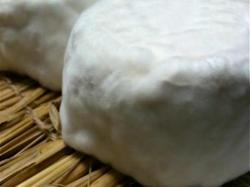This Mold’s Fur Real: Cheese Mold in Bloom
July 1, 2010 | 1 min to read

Nope, this picture isn't out of focus, the cheese is truly as fuzzy as it looks. The French call it cat fur, or poil de chat. And for good reason, as the mold on this particular family of cheese is pretty reminiscent of the coat of your furry friend. But don't fear: it's a mold that belongs to one of the most coveted types of cheese, and without it, there would be many sad cheese lovers, indeed.
This phenomenon– essentially the literal blooming of mold spores– is unique solely to the bloomy rinded family of cheese. The most common bloomy mold is called penicilium candidum, or p. candidum for short. Brie, camembert, humboldt fog, and some of the other great creamy, spreadable cheeses with those white fluffy rinds belong to this cheese category.
When this style of cheese ripens, mold activity takes place on the rind of the cheese. Mold spores literally bloom, becoming fuzzy and soft, like cat fur.
To read the rest of the story, please go to: The Kitchn.
